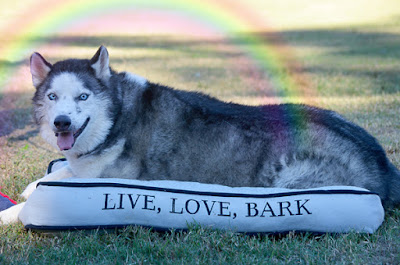#NEAM: Meet Epi-Stars Freddy & Lilly of Shadow Husky Rescue
Epi-Star, "Freddy" & "Lilly"

by Dorothy Wills-Raftery
November is National
Epilepsy Awareness Month (#NEAM) and each year I'm pleased to highlight
amazing dogs living with epilepsy (Epi-dogs) as part of my Annual
#LiveGibStrong #Epi-Star Features!
All of these stories are also listed on my Special Series page HERE so you can read about all of our featured fabulous canine Epi-stars!
A brief recap for those new to my blog: I was inspired by my beloved Gibson, who was diagnosed with idiopathic
epilepsy in 2009 shortly after his third birthday. I began the #LiveGibStrong Canine Epilepsy Awareness and Education Initiative, and also authored the What's Wrong With Gibson? Learning About K-9 Epilepsy children's book and the multi-award winning EPIc Dog
Tales: Heartfelt Stories About Amazing Dogs Living & Life With Canine
Epilepsy book that inspired this series. It is a 264-page beautiful coffee table book, where I share stories
of amazing Epi-dogs from across
the breeds and across the world. As a follow-up to all the amazing
Epi-dogs and caregivers I've met along the way writing the book, this #NEAM series picks up where my
book left, and I continue to feature annual stories each November about these
amazing
dogs who have Canine Epilepsy, but never let
that
stop them from living and loving life as only a dog can.
Today, I'm so pleased
to shine a spotlight on two beautiful Huskies from Shadow Husky Rescue, Epi-Stars "Freddy" and "Lilly!"
At the Shadow Husky Rescue, Inc. sanctuary located in California, their mission is to rescue Huskies, “That are displaced, unwanted, abused, lost, abandoned, or scheduled for euthanasia and provide them with a second chance at life by finding them permanent homes.” They also offer a lifetime sanctuary to those who need forever, loving care due to health and/or medical issues, such as Freddy and Lilly, who both have been diagnosed with idiopathic epilepsy.
"Dogs and cats can experience many of the same brain, spinal cord, and
neuromuscular problems that humans do. These all fall into the specialty
of veterinary neurology and neurosurgery, which include care for a wide
range of disorders – epilepsy, ruptured vertebral discs, spinal cord
injuries, head trauma, brain tumors, and more. Although neurological
disorders may cause great distress for pets and owners, many problems
can be treated very successfully."
~Veterinary Specialty Hospital North County
"Caring for two Huskies with epilepsy can be a challenge, but manageable," says Elizabeth McVicker, who along with her husband,
“Master Wolf” Tim McVicker, pour their love and dedication into saving
and caring for Huskies. Elizabeth explains how Tim rescued Freddy from SEAACA Downey Shelter back in July 2024, and they welcomed
Lilly in in May 2024 after her former owner passed away. “They have both
been diagnosed with idiopathic epilepsy, defined as recurrent seizures
without a cause.”
“Lilly is Miss Independent,” says Elizabeth. “She sits in the same spot all day and night in our main living room with peripheral vision of all the on-goings of the Husky pack at our sanctuary.”
Last year, however, the McVickers noticed Lilly was “Having tremors, shaking, and often standing still while moving/walking. Then, she had a seizure in early January. Her most recent seizure was on September 17th.”
Last year, however, the McVickers noticed Lilly was “Having tremors, shaking, and often standing still while moving/walking. Then, she had a seizure in early January. Her most recent seizure was on September 17th.”
“Freddy prefers to roam with the pack, but self regulates when the play time is too rough and moves to a quiet place. Freddy’s first seizure with us was last November, which lasted 45 minutes. His most recent seizure happened on October 6, 2025, during the Full Harvest Moon, which could have been a trigger for him.”
“A
significant clustering of seizures around the full moon period was
observed, supporting the ancient belief of periodic increased seizure
frequency during full-moon days.”
~ National Library of Medicine
Lunar activity has been proven to be a trigger for some dogs, and even humans. And, if triggered, the seizures could occur before, during, or even after a lunar event, such as a full moon or eclipse.
Elizabeth notes that each Husky is under the care of husband and wife vet neurologists, Drs. Gagnepain, at Veterinary Specialty Hospital North County Ethos Vet in San Marcos, CA.
Elizabeth notes that each Husky is under the care of husband and wife vet neurologists, Drs. Gagnepain, at Veterinary Specialty Hospital North County Ethos Vet in San Marcos, CA.
“Their seizures have been under control with varying dosages of Keppra XR (based on their respective weight) administered twice per day, but since Lilly and Freddy have prolonged seizures, they were also prescribed Midazolam, which is only during prolonged episodes and has helped stop their seizures,” states Elizabeth.
“When they are they going into the seizure mode, it’s pretty scary. The last two times I had to grab the Midazolam medicine really quick and get it in each of their nostrils then get them to settle down, but they don’t seize very often. We are really being vigilant about giving them their pills morning and night to avoid any triggers. It is very intense when they go into their seizures and heartbreaking at the same time.”
“Lilly is Miss Independent. She sits in the same spot all day and night in our main living room with peripheral vision of all the on-goings of the Husky pack at our sanctuary. Freddy enjoys being with the pack. He is playful during the morning, and sleeps inside at night. We have six acres of land, so they have plenty of room to roam.”
~Elizabeth McVicker, Shadow Husky Rescue
When a dog has a seizure, it is indeed frightening to see, and as Elizabeth says, “Of course there is panic and all the other dogs need to get out of the way.” It’s important to separate a seizing dog as sometimes the other dogs may become frightened and confused by what is happening, and could attack the seizing dog. So for safety reasons, it is always an important policy to remove all other pets from the area.
Cooling an Epi-dog who has had a seizure, as well as even before, helps to keep their body temperature from rising dangerously high, which can happen during a seizure. “We always keep Lilly and Freddy’s heads cool, and spoon feed vanilla ice cream afterward to help stabilize their blood sugar," notes Elizabeth. "If you have an Epi-dog, 'FiveSibesMom' Dorothy Wills-Raftery of FiveSibes: Siberian Husky K9 News & Reviews has created an online #LiveGibStrong Canine Epilepsy Resource Library at https://fivesibes.blogspot.com/p/live-gib-strong.html.
Not sure where to put the cool packs when your dog has a seizure? Here is my FiveSibes #LiveGibStrong vetted poster to help:
Even though Freddy and Lilly have epilepsy, it certainly does not stop them from enjoying the same things dogs who are non-Epis enjoy.
“Freddy enjoys being with the pack," notes Elizabeth. "He is playful during the morning, and sleeps inside at night. We have six acres of land, so they have plenty of room to roam. Lilly was best friends with our late Husky, "Freckles," they were always together, side by side.”
Freckles came to Shadow Husky Rescue last May from a rescue in Arizona when the owner passed away. Freckles had been rescued “After some punk kids chopped off her right back leg from the middle joint to her foot and threw her in a trash container where someone heard her cry for help,” sadly recalls Elizabeth, who says Lilly became fast friends with Freckles, and although Freckles could not walk on her own without assistance, she would enjoy occasional pillow zoomies. “Freckles earned her furangel wings this past summer, but it was a blessing to love her and see her through to the end.” Elizabeth notes that since losing her best friend, "Lilly is now mostly sedentary, but has a good spot to watch everything in our main living room.”
“We love them all completely.”
~Elizabeth McVicker, Shadow Husky Rescue, Inc.
Freddy and Lilly will always enjoy life together at Shadow Husky Rescue’s sanctuary. And, if or when they have another seizure, the McVickers are ready to help these two beautiful Epi-dogs through it.
“We love them all completely,” adds Elizabeth.
Lilly and Freddy are two happy Epi-dogs,
living their best life with at Shadow Husky Rescue
under the forever and loving care of Elizabeth and "Master Wolf" Tim McVicker!
Epi-Dogs Rock!
Note: These
are the personal stories of Epi-dogs as told to me by their families. As
always, discuss any medications, alternative treatments, new foods,
etc., with your veterinarian first.
Caregivers
of dogs with epilepsy are amazing folks. It's so important to remember
to care for yourselves, as well as your Epi-dog! Please be sure to watch
my special presentation in partnership with The Companion Animal
Epilepsy Research Lab at North Carolina State University~College of
Veterinary Medicine
"Caring for the Epi-Dog and Caregiver: The Importance of Self-Care"
If you are looking for information on Canine Epilepsy, check out our FiveSibes #LiveGibStrong K-9 Epilepsy Online Resource Library where you will find accurate and vetted information you can trust including links, articles, podcasts with vets and veterinary experts, helpful tips, bookmarks, where to go if you need financial help with epilepsy medications,. Epi-Star success stories, and much more. It's a great place to seek out information so that you can have an in-depth conversation with your vet about your Epi-dog's care.
💜
The Inspirational Book Behind
This Epi-Star Feature Series To purchase my book, go to our FiveSibes
A percentage of sales will be donated to Canine Epilepsy Research.
✭To View other Epi-Star Stories in the Series, visit HERE.
Return to FiveSibes Main Menu & #LiveGibStrong K-9 Epilepsy Online Resource Library HERE!
💜
Get my book featuring beautiful Epi-dogs across the world:

For more info & to see the stops on my Wolfie, What Is The Rainbow Bridge? virtual book tour, check HERE!































Such sweet, sweet pups.
ReplyDeleteWhat a joy, these people who give their time an efforts to rescue huskies in need.
ReplyDeleteStay strong Epilepsy Warriors Lilly & Freddy! You are loved 🐾💜🐾
ReplyDeleteOMD!!! Shadow Husky Rescue, Elizabeth, and Tim are heroes! I can't imagine what poor Freckles went through. Horrible!!! I will never understand that abuse nor do I want to understand it. Although, Lilly and Freddy are not seizure free yet, they are definitely in the most loving home with loving care from their vet. Thank you Dorothy, for bringing these stories to life and sharing how Epi-Dogs are amazing and worth the effort. Beautiful story! I'm sharing with all my dog parents.
ReplyDeleteFreddy and Lilly are so lucky to be living with such kind and compassionate people. Dorothy, you've been such a wonderful resource for people living with epi dogs, and I know these features will help them feel less alone. As you know my heart dog Red had a few seizures and it was one of the most terrifying things to witness. Understanding what's happening, being prepared and having a plan helps.
ReplyDeleteThese are two very special (and lucky) huskies! And my heart goes out to their humans at the rescue. 45 minutes I'm sure felt like 10 lifetimes watching the seizure. I'm so glad they have loving such a great team of caregivers to keep an eye on them.
ReplyDelete